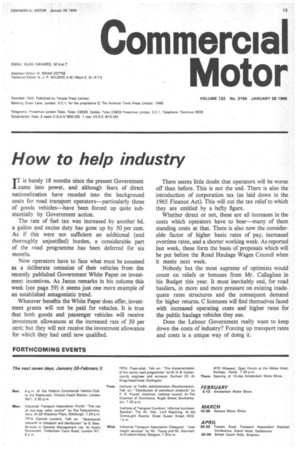How to help industry
Page 17

If you've noticed an error in this article please click here to report it so we can fix it.
TT is barely 18 months since the present Government came into power, and although fears of direct nationalization have receded into the background costs for road transport operators—particularly those of goods vehicles—have been forced up quite substantially by Government action.
The rate of fuel tax was increased by another 6d. a gallon and excise duty has gone up by 50 per cent. As if this were not sufficient an additional (and thoroughly unjustified) burden, a considerable part of the road programme has been deferred for six months.
Now operators have to face what must be assumed as a deliberate omission of their vehicles from the recently published Government White Paper on investment incentives. As Janus remarks in his column this week (see page 59) it seems just one more example of an established antagonistic trend.
Whatever benefits the White Paper does offer, investment grants will not be paid for vehicles. It is true that both goods and passenger vehicles will receive investment allowances at the increased rate of 30 per cent; but they will not receive the investment allowance for which they had until now quali,fied. There seems little doubt that operators will be worse off than before. This is not the end. There is also the introduction of corporation tax (as laid down in the 1965 Finance Act). This will cut the tax relief to which they are entitled by a hefty figure.
Whether direct or not these are all increases in the costs which operators have to bear—many of them standing costs at that. There is also now the considerable factor of higher basic rates of pay, increased overtime rates, and a shorter working week, As reported last week, these form the basis of proposals which will be put before the Road Haulage Wages Council when it meets next week.
Nobody but the most supreme of optimists would count on reliefs or bonuses from Mr. Callaghan in his Budget this year. It must inevitably end, for road hauliers, in more and more pressure on existing inadequate rates structures and the consequent demand for higher returns. C licensees will find themselves faced with increased operating costs and higher rates for the public haulage vehicles they use.
Does the Labour Government really want to keep down the costs of industry? Forcing up transport rates and costs is a unique way of doing it.












































































































